Contents
- The Collective Grief of RTO
- The Opposite of Happiness (It’s Not Sadness)
- No-One Prefers the Office to WFH
- Work-Life Balance: The Only Perk That Matters
- Why Being Lonely and Isolated is a Good Thing
- The Happiness You Deserve
Why are remote workers 20% happier? Get the hidden benefits of working from home and how the office may be stealing your joy in this revealing article.
On a scale of 1-10 – how happy are you at work?
This was the question posed by Tracking Happiness, a company who surveyed over 12,455 people from across the US, Asia, South America and Europe.
The findings were clear:
- People who work fulltime at the office have an average of 5.90
- Fulltime remote workers averaged 7.04
Those who are given the chance to work remotely are 20% happier. For this study, that’s an additional 2491 people who are living their best lives, every day.
That’s enough people to fill 8 full-size Boeing 737s, or nearly two high school auditoriums.
A twenty percent difference is MASSIVE.
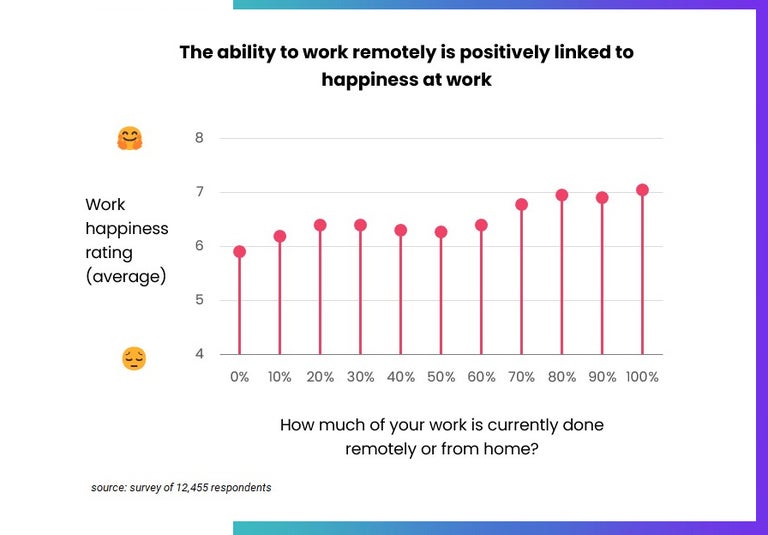
Remote work makes people happy.
So, when I read about Dell workers refusing to comply with yet another illogical return-to-office mandate push, I wasn’t surprised.
This article reveals the true happiness hidden in fulltime remote work, exposing the office for what it often is – a dreary, joy-sucking trap.
The Collective Grief of RTO
A lot of people are saying heck-no to return-to-office mandates.
As companies play chicken with the lives of their workers to see who will quit first – many have become wise to these soft layoff tactics.
Instead, they’ve chosen a defense popularized by cheating spouses: ignorance.
Hey what works, works.
- Best case scenario they’re left alone.
- Worst case they still get their severance payments.
Reddit is brimming with threads offering advice on how to avoid leaving the remote work life behind. And this means not playing ball with strong-arm tactics.
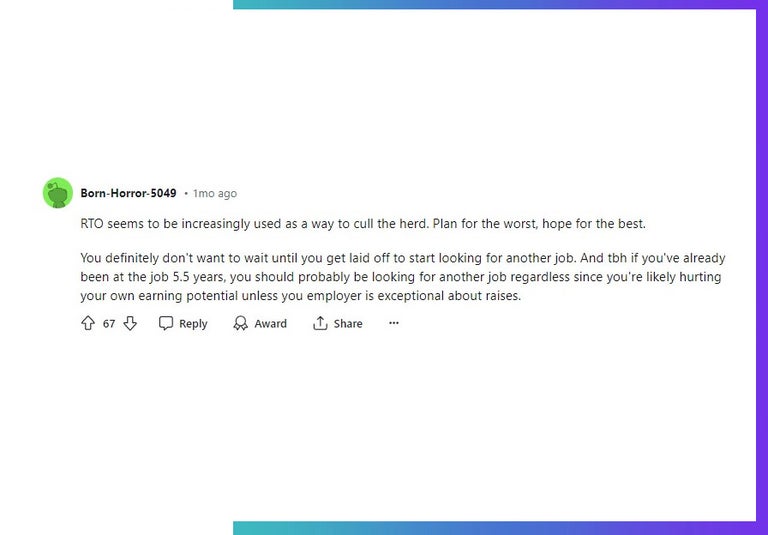
In one way or another tech workers are grieving loss. The loss of their jobs, their job security, and perhaps the most impactful – the way that they work.
Because the office ROBS you of your happiness.
There’s a collective grief in the tech world right now that can’t be silenced.
Or can it?
The Opposite of Happiness (It’s Not Sadness)
The pandemic gave workers unique insight into what they were missing.
Allowed to work from home for the first time, many knowledge workers suddenly realized the way they had been operating before was messed up.
John Lennon arguably once said:
“When I was 5 years old, my mother always told me that happiness was the key to life. When I went to school, they asked me what I wanted to be when I grew up. I wrote down ‘happy’. They told me I didn’t understand the assignment, and I told them they didn’t understand life.”
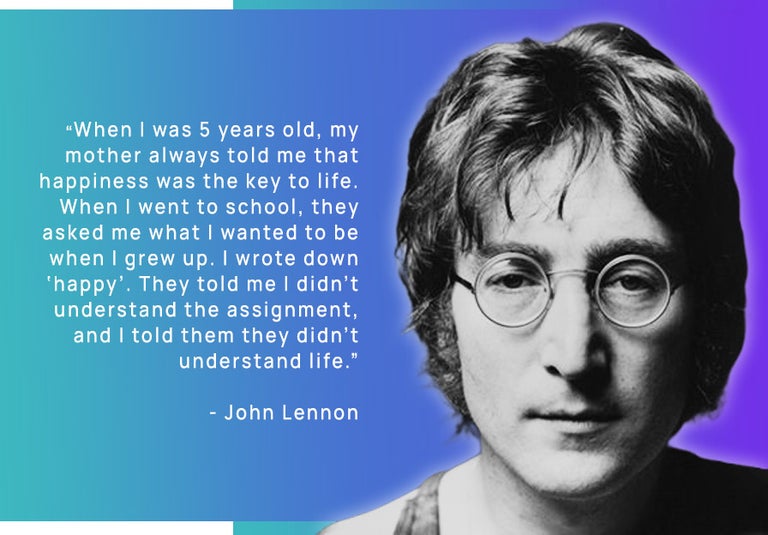
Forced return-to-office mandates are causing misery, because it feels like companies are asking for the keys back. They’re going against the wishes of nearly every remote worker out there, dismantling the ‘happy’ they’ve found outside of the office.
And here’s the truth. The opposite of happiness isn’t sadness: it’s dissatisfaction.
Currently nobody’s wishes are being met.
A Global Work-Life Survey found that remote workers were ‘extremely satisfied’ with their jobs. A stark contrast to the 34% who were equally as satisfied at the office.
So, companies aren’t just robbing remote workers of happiness - they’re plunging them into a state of loss. They’re causing dissatisfaction on a previously unheard-of scale.
It’s exactly the same as giving a child an ice-cream on a hot day, letting them enjoy a few delicious bites – then suddenly snatching it away. We have all been left to watch ‘what could be’ melt on the boiling pavement.
And now we’re being lied too again.
No-One Prefers the Office to WFH
The pandemic was the Scooby-Doo villain reveal we all needed.
And surprise, surprise – the villain all along was the OFFICE.
In episode 44 of Out of Office Andrew shone a spotlight on a phenomenon that has only escalated these past 10 months: The Myth of The Magical Office.
Make no mistake – people don’t like it there. Some would rather get a root canal than leave behind the life they’ve built and go back to office days.
We see it in the battles being fought between employee and employer in tech.
Despite articles saying it’s the commute people hate, not the office. Despite the media syndicating studies and findings that dump on remote work.
And that’s to hide one BIG AHA MOMENT they don’t want you to have. So, here it is – what they don’t want you to realize.
Work-life balance doesn’t exist at the office.
Incase you haven’t been paying attention – there are libraries of studies that show improved work-life balance makes everything better for everyone.
- Increased productivity, time management and wellbeing
- Less stress, greater engagement and higher retention
- Greater growth, less absenteeism, higher morale
The list goes on.
Work-Life Balance: The Only Perk That Matters
There is no work-life balance at the office.
There, I said it.
What is balanced about sacrificing your unpaid time and actual money to drive to a place full of distractions, stress and micro-managers (not just your own, but many others on that lovely open-plan floor).
We talk about the importance of work-life balance a lot – while ignoring the fact that it ONLY exists when you work remotely.
In the US some 60% of workers say they don’t have any boundaries between work responsibilities and life. While 79% believe flexibility is the key to better balance.
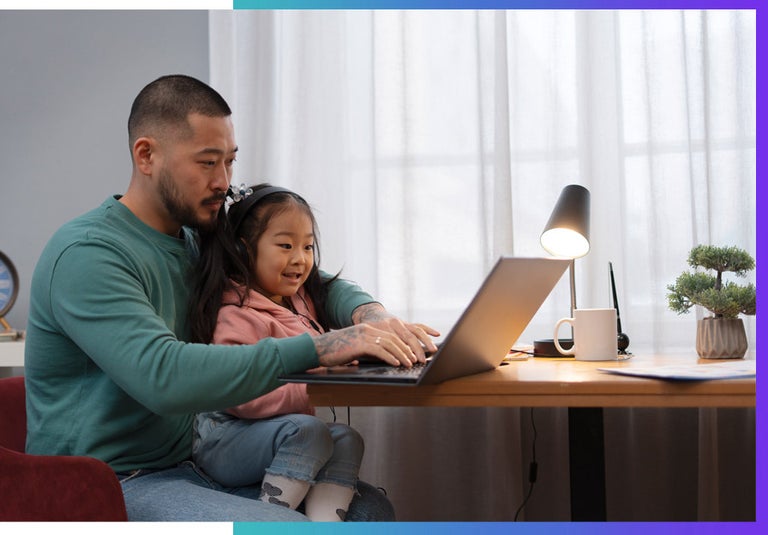
When you RTO you lose:
- Your self-expression and comfort: You have to give up on spaces where you can do your best work and feel like your best self. Comfort has been linked to an 8.6% increase in productivity while working.
- Your safety: Private spaces where you can work uninterrupted, free from discrimination, stress, and micromanagement. Again, safety has been linked to greater productivity in workers, enhanced teamwork and better time management.
- Your people: Stepping away from close relationships, partners, friends and family to spend the majority of time with superficial work connections. Studies show that meaningful connections lower stress, improve health and lengthen your life expectancy.
- Your time: Being forced to commute for 1-4 hours every day is a huge drain on your time, energy and mental health. It damages productivity, lowers innovation and exhausts your top talent.
- Your schedule: The office is a place where you must appear to be productive at all times, instead of finding your most productive windows. This heightens stress, erodes trust in management, negatively impacts mental health.
- Your pets: Leaving your beloved pets at home all day on their own is enough to make anyone miserable. Since the RTO calls, there’s been a surge in separation anxiety for pets and owners, prompting 10% of people to rehome their dogs.
- Your breaks: The loss of productive breaks at home (laundry, chores) leads to less actual rest time over the weekends. No more rest for working moms, who count on flexibility to get things done.
The office is a literal work-life heist.
You’re exchanging one for the other. The balance part is a mirage. You’re distracted by the ping-pong table, free cake and coffee, and Wednesday massages the office offers.
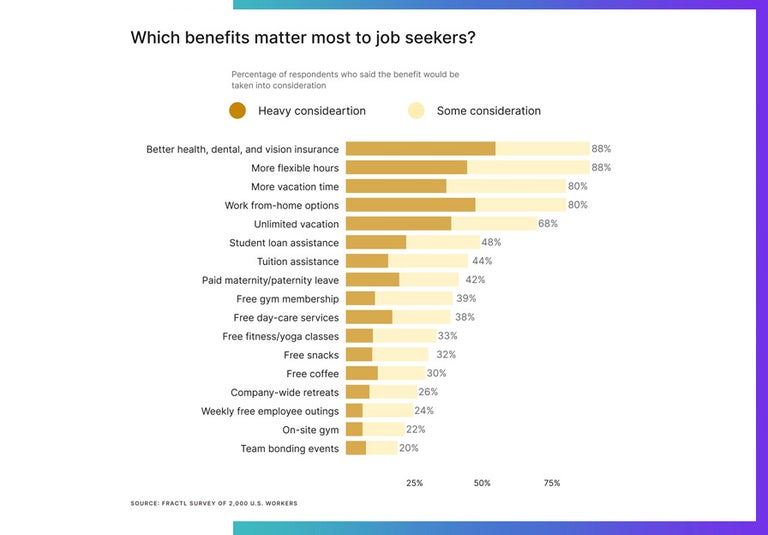
While you’re overworking yourself on-site in a modern-day gladiator arena, they steal your autonomy, your flexibility and the many, many social perks that come with being a remote worker.
The only perk that really matters is work-life balance.
Which brings me to my final point.
Why Being Lonely and Isolated is a Good Thing
The latest Gallup Global Emotions Report has added loneliness to its index for the first time. People are lonelier and more isolated than ever before.
There are dozens of articles online saying remote work causes loneliness.
And while I don’t believe for a second remote work causes loneliness – I do think it’s a good thing for remote workers to experience.
It’s the start of figuring out how to reconcile the life you had, with the one you have now.
How to go from caged, to free.
In a bad relationship, to heal the first thing you need is distance. Distance gives you context, time to think about your feelings, and to plan for things to get better. The pandemic was that distance for many people. Things stopped. People woke-up.

Without the initial loneliness and isolation that would not have happened.
Instead of seeing remote workers and lonely and sad, I see them as starting on an important journey of finding their own work-life balance.
Because for – perhaps the first time – they are embarking on the important work of being happier.
The Happiness You Deserve
So, what is the real reason remote work makes you happier?

Looking back over the past few years three fundamental truths have become clear.
- Workers don’t want to go back to where flexibility is 0%
- Work-life balance doesn’t exist at the office
- Happier workers perform better
Remote work gives you the keys to designing a life that works for you.
It gives you the valuable distance you need to make better decisions about the work you do, who you do it with, and why you do it.
It makes room for you to build a life centered around your preferences, instead of the office. It invites you to feel the loneliness the office masks with flashy perks, bad boundaries and superficial connections.
It gives you the opportunity to start life over – and make it better.
To make yourself better - so that you can be happy.
Isn't that worth risking it all?









